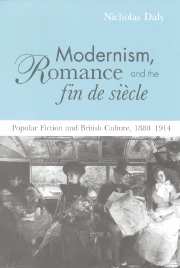Book contents
- Frontmatter
- Contents
- Acknowledgements
- Introduction
- 1 Incorporated bodies: Dracula and professionalism
- 2 The imperial treasure hunt: The Snake's Pass and the limits of romance
- 3 ‘Mummie is become merchandise’: the mummy story as commodity theory
- 4 Across the great divide: modernism, popular fiction and the primitive
- Afterword: the long goodbye
- Notes
- Index
4 - Across the great divide: modernism, popular fiction and the primitive
Published online by Cambridge University Press: 23 November 2009
- Frontmatter
- Contents
- Acknowledgements
- Introduction
- 1 Incorporated bodies: Dracula and professionalism
- 2 The imperial treasure hunt: The Snake's Pass and the limits of romance
- 3 ‘Mummie is become merchandise’: the mummy story as commodity theory
- 4 Across the great divide: modernism, popular fiction and the primitive
- Afterword: the long goodbye
- Notes
- Index
Summary
I have been arguing that the popular fiction of the fin de siècle, with its mummies, vampires and treasure hunts, challenged the realist novel for the part of principal literary vehicle of middle-class culture, offering its readers a species of popular theory of social change in narrative form. Until recently, however, criticism perceived this as a marginal and even juvenile literature, rather than as something culturally central. Moreover – and this is a disposition that hasn't entirely disappeared, despite the new prestige of cultural studies – we tend to view our own activities as critics of this literature as not altogether serious. There lingers what might be termed a fear of going native, of drifting across the border between academic work and the pursuits of the Sherlock Holmes Society. Whence this critical guilt? It may in part be attributable to that more general suspicion of the novel as a lightweight genre that persisted throughout the nineteenth century, and that lives on in the twentieth at the level of curricular hierarchy in many university English departments. A more likely explanation, though, is that literary criticism inherits many of its assumptions from the ‘great divide’ discussed in the Introduction, taking for granted the existence of a profound gulf between modernism and popular fiction, between ‘real literature’ and fiction for the masses.
Of course, historically speaking, a divide did open up between high modernism and mass culture, between ‘serious’ books and mass-marketed genre fiction.
- Type
- Chapter
- Information
- Modernism, Romance and the Fin de SièclePopular Fiction and British Culture, pp. 117 - 148Publisher: Cambridge University PressPrint publication year: 2000



